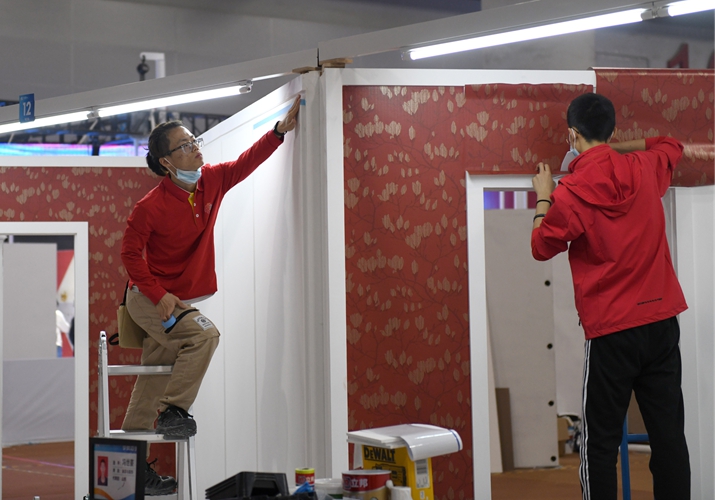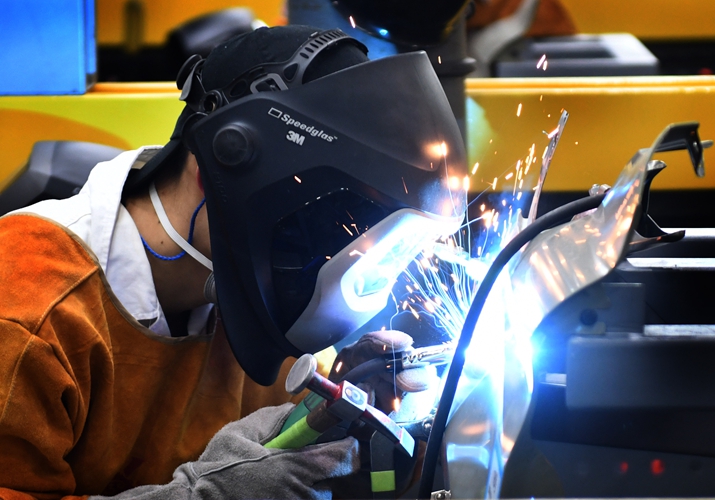| Business |
| Vocational education offers more channels to realize personal worth as well as quality economic development | |
|
|
|
A contestant participates in a baking event during the First Vocational Skills Competition of China in Guangzhou, Guangdong Province in south China, on December 11(XINHUA) For Shen Sijing, cooking is like magic—turning food ingredients into exquisite cuisine, both pleasing to the eye and the stomach. "I feel happy when I cook, and this happiness made me pursue cooking as a profession," she told Guangming Daily. In December, the 22-year-old won the silver at the First Vocational Skills Competition of China held in Guangzhou, Guangdong Province in south China, in the Western cuisine category.
Behind the glory is hard work and learning by trial and error. Shen majored in cooking and nutrition education in Hubei University of Economics in Wuhan, Hubei Province in central China. After graduation this summer, she remained in the university and began to work as a teacher.
When she started to learn cooking, she couldn't hold the knife correctly or wear the chef's uniform right. So she had a slow start.
But with time and efforts, when each turnip turned into the exact shape she wanted, she realized more than ever that cooking is an art. Now she works on integrating Western dishes with traditional Chinese cuisine elements. "I'm willing to make every effort to become a culinary artist," Shen said.
 Contestants install wallpaper during the First Vocational Skills Competition on December 10(XINHUA)
Vying for improvement
The vocational skills competition, held on December 10-13, featured over 2,500 contestants from across the country and 86 events covering 14 major industries. They included manufacturing, information technology, transportation, architecture and services, accounting for 70 percent of China's industries.
According to Zhang Lixin, Secretary General of the organizing committee, the event was meant to make talents stand out and help them find high-quality employment.
"High-caliber technicians are indispensable for the manufacturing industry. Skilled workers have always been very valuable for us," Yin Jie, Director of the Brand Public Relations Department of the Guangzhou Automobile Group, told Economic Daily. Yin watched the competition on site and expressed his willingness to offer jobs to some participants.
"We want to use this platform to let more people know about vocational education, so our talents can gain more social respect and widely apply new technologies, new techniques and new methods in vocational training," said Zhang, who is also head of the professional capabilities development department at the Ministry of Human Resources and Social Security.
The winners of the competition will be selected as reserve talents for future WorldSkills Competitions. So far, China has participated in five such contests and won multiple medals. The 46th WorldSkills Competition will take place in Shanghai in 2022.
"We hope that more highly skilled craftsmen can be cultivated in China," Zhang said.
 A contestant participates in an automotive maintenance event during the First Vocational Skills Competition on December 11(XINHUA)
Nurturing talent
In 2019, the State Council issued a plan for implementing vocational education reform, detailing measures to improve the national systems and policies on vocational education and lift the quality of both secondary and higher vocational education. It also said national standards for vocational education will be established and standards on teaching, education materials and teachers will be met so that craftsmanship is nurtured and passed down.
Ministry of Education (MOE) statistics show that in the past five years, vocational education institutions supplied more than 70 percent of the newly employed frontline workers in modern manufacturing, strategic and emerging industries, and modern services.
Vocational education is essential for creating a quality labor force, as well as supporting technological innovation and the development of the real economy, according to Ma Shuchao, Deputy Director of the Expert Committee of the China Vocational Education Association.
It also plays an important role in stopping poverty from being passed on to the next generation. More than 70 percent of students in vocational colleges and schools come from rural areas, according to Chen Ziji, in charge of vocational education and adult education at the MOE.
In the 14th Five-Year Plan (2021-25), boosting vocational education quality is on the agenda.
According to the MOE, the vocational colleges are expanding enrollment, aiming for an increase of 2 million in 2020 and 2021, respectively.
Chen said that while higher vocational education students previously consisted of primarily high school and secondary vocational school graduates, now they boast diverse backgrounds, including veterans, laid-off workers and migrant workers.
The MOE is carrying out a series of measures including setting targeted majors, tailoring training programs and carrying out flexible assessments to ensure the quality of education. Vocational education institutions and enterprises are encouraged to cooperate in running schools.
However, there is still a serious shortage of talents, more in terms of technical ones than academic, according to Xing Hui, Director of the Vocational Education Research Center at the National Academy of Education Administration.
"When entire society treats vocational education and general education equally, vocational education will blossom," Xing said at a conference in December, adding that many Chinese give more importance to academic education, and less to vocational education. Many family members of students don't recognize vocational education and urge them to prioritize general education.
Yang Wanting, mother of a high school student, said previously she would have been reluctant to have her daughter go to a vocational institution after high school because being a skilled technician meant doing more manual labor than mental work. Also, the relatively low salary for skilled personnel in the sector in general was discouraging.
But now she is more accepting, especially after seeing the participants' performance at the national skills competition on television. "I'll be happy to see my daughter learn to be a make-up artist at a vocational college, to follow her passion and develop her skill to the fullest," Yang told Beijing Review.
"No matter how difficult it is, I never regret choosing vocational education. I can see the increasing importance given to vocational education, while society has a greater demand for skilled personnel like me," Shen said.
(Print Edition Title: Hands-On Skills)
Copyedited by Sudeshna Sarkar
Comments to luyan@bjreview.com
|
|
||||||||||||||||||||||||||||
|